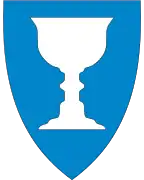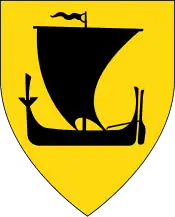Gildeskål
Gildeskål is a municipality in Nordland county, Norway. It is part of the Bodø Region and the traditional district of Salten. The administrative centre of the municipality is the village of Inndyr. Other villages include Forstranda, Lekanger, Mevik, Mårnes, Nygårdsjøen, Saura, Storvika, Sør-Arnøy, Sørfinnset, and Våg.
Gildeskål kommune | |
|---|---|
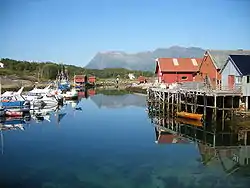 View of Inndyr | |
 Flag 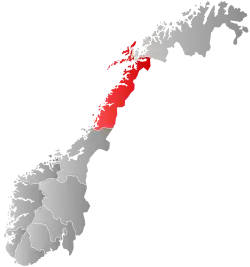 Nordland within Norway | |
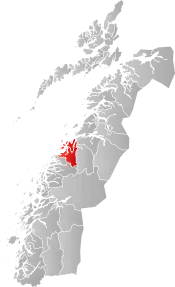 Gildeskål within Nordland | |
| Coordinates: 67°01′24″N 14°04′38″E | |
| Country | Norway |
| County | Nordland |
| District | Salten |
| Established | 1 Jan 1838 |
| • Created as | Formannskapsdistrikt |
| Administrative centre | Inndyr |
| Government | |
| • Mayor (2019) | Bjørn Magne Pedersen (H) |
| Area | |
| • Total | 664.70 km2 (256.64 sq mi) |
| • Land | 622.26 km2 (240.26 sq mi) |
| • Water | 42.44 km2 (16.39 sq mi) 6.4% |
| • Rank | #170 in Norway |
| Population (2022) | |
| • Total | 1,894 |
| • Rank | #285 in Norway |
| • Density | 3/km2 (8/sq mi) |
| • Change (10 years) | |
| Demonyms | Gildeskålfjerding Gildeskålværing[1] |
| Official language | |
| • Norwegian form | Neutral |
| Time zone | UTC+01:00 (CET) |
| • Summer (DST) | UTC+02:00 (CEST) |
| ISO 3166 code | NO-1838 |
| Website | Official website |
The 665-square-kilometre (257 sq mi) municipality is the 170th largest by area out of the 356 municipalities in Norway. Gildeskål is the 285th most populous municipality in Norway with a population of 1,894. The municipality's population density is 3 inhabitants per square kilometre (7.8/sq mi) and its population has decreased by 5.3% over the previous 10-year period.[3][4]
General information
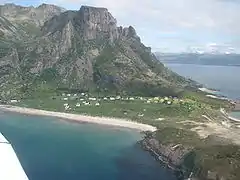
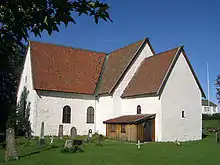
The municipality of Gildeskaal (later spelled Gildeskål) was established as a municipality on 1 January 1838 (see formannskapsdistrikt law). In 1853, the eastern (inland) district of Gildeskaal (population: about 1,150) was separated to become the new municipality of Beiarn. This left Gildeskaal with about 2,400 residents. The municipal boundaries have not changed since.[5]
Name
The municipality (originally the parish) is named after the old Gildeskaal farm (Old Norse: Gildaskáli) since the first Gildeskål Church was built there. The first element is the plural genitive case of gildi which means "feast" or "banquet". The last element is skáli which means "hall".[6]
Coat of arms
The coat of arms was granted on 12 February 1988. The official blazon is "Azure, a chalice argent" (Norwegian: I blått en sølv kalk). This means the arms have a blue field (background) and the charge is a chalice. The chalice has a tincture of argent which means it is commonly colored white, but if it is made out of metal, then silver is used. The arms are canting since the meaning of the municipal name Gildeskål refers to a banquet hall (or guildhall) which, of course, is a place where one might drink from a chalice. The arms were designed by Arvid Sveen.[7][8][9]
Churches
The Church of Norway has one parish (sokn) within the municipality of Gildeskål. It is part of the Bodø domprosti (arch-deanery) in the Diocese of Sør-Hålogaland.
| Parish (sokn) | Church name | Location of the church | Year built |
|---|---|---|---|
| Gildeskål | Gildeskål Church | Inndyr | 1881 |
| Old Gildeskål Church | Inndyr | 12th century | |
| Saura Church | Saura | 1884 | |
| Mevik Chapel | Mevik | 1910 | |
| Nordstranda Chapel | Lekanger | 1963 | |
| Sørfjorden Chapel | Sørfinnset | 1957 |
Geography
Gildeskål is a coastal municipality that encompasses part of the mainland as well as many islands. Major islands include Fleina, Fugløya, Nordarnøya, Sørarnøya, and Sandhornøya. The southern part of the municipality includes part of the Saltfjellet mountains and the northern part of the municipality borders the Saltfjorden and the Vestfjorden.
There are many lakes in the municipality including: Fellvatnet, Langvatnet, Litle Sokumvatnet, and Sokumvatnet.
Government
All municipalities in Norway, including Gildeskål, are responsible for primary education (through 10th grade), outpatient health services, senior citizen services, unemployment and other social services, zoning, economic development, and municipal roads. The municipality is governed by a municipal council of elected representatives, which in turn elect a mayor.[10] The municipality falls under the Salten District Court and the Hålogaland Court of Appeal.
Municipal council
The municipal council (Kommunestyre) of Gildeskål is made up of 17 representatives that are elected to four year terms. The party breakdown of the council is as follows:
| Party Name (in Norwegian) | Number of representatives | |
|---|---|---|
| Labour Party (Arbeiderpartiet) | 4 | |
| Progress Party (Fremskrittspartiet) | 2 | |
| Conservative Party (Høyre) | 3 | |
| Centre Party (Senterpartiet) | 3 | |
| Socialist Left Party (Sosialistisk Venstreparti) | 1 | |
| Gildeskål List (Gildeskållista) | 4 | |
| Total number of members: | 17 | |
| Party Name (in Norwegian) | Number of representatives | |
|---|---|---|
| Labour Party (Arbeiderpartiet) | 7 | |
| Progress Party (Fremskrittspartiet) | 2 | |
| Conservative Party (Høyre) | 3 | |
| Centre Party (Senterpartiet) | 3 | |
| Socialist Left Party (Sosialistisk Venstreparti) | 1 | |
| Joint list of the Liberal Party (Venstre) and Christian Democratic Party (Kristelig Folkeparti) | 1 | |
| Total number of members: | 17 | |
| Party Name (in Norwegian) | Number of representatives | |
|---|---|---|
| Labour Party (Arbeiderpartiet) | 5 | |
| Progress Party (Fremskrittspartiet) | 3 | |
| Conservative Party (Høyre) | 3 | |
| Centre Party (Senterpartiet) | 2 | |
| Socialist Left Party (Sosialistisk Venstreparti) | 1 | |
| Liberal Party (Venstre) | 2 | |
| Arnøy List (Arnøylista) | 1 | |
| Total number of members: | 17 | |
| Party Name (in Norwegian) | Number of representatives | |
|---|---|---|
| Labour Party (Arbeiderpartiet) | 4 | |
| Progress Party (Fremskrittspartiet) | 3 | |
| Conservative Party (Høyre) | 3 | |
| Christian Democratic Party (Kristelig Folkeparti) | 1 | |
| Centre Party (Senterpartiet) | 2 | |
| Socialist Left Party (Sosialistisk Venstreparti) | 2 | |
| Liberal Party (Venstre) | 2 | |
| Total number of members: | 17 | |
| Party Name (in Norwegian) | Number of representatives | |
|---|---|---|
| Labour Party (Arbeiderpartiet) | 5 | |
| Progress Party (Fremskrittspartiet) | 2 | |
| Conservative Party (Høyre) | 3 | |
| Christian Democratic Party (Kristelig Folkeparti) | 1 | |
| Coastal Party (Kystpartiet) | 1 | |
| Centre Party (Senterpartiet) | 1 | |
| Socialist Left Party (Sosialistisk Venstreparti) | 1 | |
| Liberal Party (Venstre) | 1 | |
| Gildeskål common list (Gildeskål Felleslister) | 2 | |
| Total number of members: | 17 | |
| Party Name (in Norwegian) | Number of representatives | |
|---|---|---|
| Labour Party (Arbeiderpartiet) | 8 | |
| Conservative Party (Høyre) | 6 | |
| Christian Democratic Party (Kristelig Folkeparti) | 3 | |
| Centre Party (Senterpartiet) | 2 | |
| Liberal Party (Venstre) | 2 | |
| Total number of members: | 21 | |
| Party Name (in Norwegian) | Number of representatives | |
|---|---|---|
| Labour Party (Arbeiderpartiet) | 7 | |
| Conservative Party (Høyre) | 5 | |
| Christian Democratic Party (Kristelig Folkeparti) | 2 | |
| Centre Party (Senterpartiet) | 5 | |
| Socialist Left Party (Sosialistisk Venstreparti) | 1 | |
| Liberal Party (Venstre) | 1 | |
| Total number of members: | 21 | |
| Party Name (in Norwegian) | Number of representatives | |
|---|---|---|
| Labour Party (Arbeiderpartiet) | 7 | |
| Conservative Party (Høyre) | 5 | |
| Christian Democratic Party (Kristelig Folkeparti) | 2 | |
| Centre Party (Senterpartiet) | 3 | |
| Socialist Left Party (Sosialistisk Venstreparti) | 2 | |
| Liberal Party (Venstre) | 2 | |
| Total number of members: | 21 | |
| Party Name (in Norwegian) | Number of representatives | |
|---|---|---|
| Labour Party (Arbeiderpartiet) | 11 | |
| Conservative Party (Høyre) | 6 | |
| Christian Democratic Party (Kristelig Folkeparti) | 2 | |
| Centre Party (Senterpartiet) | 1 | |
| Liberal Party (Venstre) | 1 | |
| Total number of members: | 21 | |
| Party Name (in Norwegian) | Number of representatives | |
|---|---|---|
| Labour Party (Arbeiderpartiet) | 11 | |
| Conservative Party (Høyre) | 6 | |
| Christian Democratic Party (Kristelig Folkeparti) | 2 | |
| Centre Party (Senterpartiet) | 1 | |
| Liberal Party (Venstre) | 1 | |
| Total number of members: | 21 | |
| Party Name (in Norwegian) | Number of representatives | |
|---|---|---|
| Labour Party (Arbeiderpartiet) | 11 | |
| Conservative Party (Høyre) | 7 | |
| Christian Democratic Party (Kristelig Folkeparti) | 3 | |
| Centre Party (Senterpartiet) | 3 | |
| Liberal Party (Venstre) | 1 | |
| Total number of members: | 25 | |
| Party Name (in Norwegian) | Number of representatives | |
|---|---|---|
| Labour Party (Arbeiderpartiet) | 12 | |
| Conservative Party (Høyre) | 4 | |
| Christian Democratic Party (Kristelig Folkeparti) | 3 | |
| Centre Party (Senterpartiet) | 5 | |
| Liberal Party (Venstre) | 1 | |
| Total number of members: | 25 | |
| Party Name (in Norwegian) | Number of representatives | |
|---|---|---|
| Labour Party (Arbeiderpartiet) | 10 | |
| Conservative Party (Høyre) | 2 | |
| Christian Democratic Party (Kristelig Folkeparti) | 2 | |
| Centre Party (Senterpartiet) | 4 | |
| Socialist People's Party (Sosialistisk Folkeparti) | 1 | |
| Liberal Party (Venstre) | 3 | |
| Local List(s) (Lokale lister) | 3 | |
| Total number of members: | 25 | |
| Party Name (in Norwegian) | Number of representatives | |
|---|---|---|
| Labour Party (Arbeiderpartiet) | 13 | |
| Conservative Party (Høyre) | 3 | |
| Christian Democratic Party (Kristelig Folkeparti) | 3 | |
| Centre Party (Senterpartiet) | 2 | |
| Socialist People's Party (Sosialistisk Folkeparti) | 1 | |
| Liberal Party (Venstre) | 3 | |
| Total number of members: | 25 | |
| Party Name (in Norwegian) | Number of representatives | |
|---|---|---|
| Labour Party (Arbeiderpartiet) | 11 | |
| Christian Democratic Party (Kristelig Folkeparti) | 3 | |
| Liberal Party (Venstre) | 2 | |
| List of workers, fishermen, and small farmholders (Arbeidere, fiskere, småbrukere liste) | 4 | |
| Local List(s) (Lokale lister) | 5 | |
| Total number of members: | 25 | |
| Party Name (in Norwegian) | Number of representatives | |
|---|---|---|
| Labour Party (Arbeiderpartiet) | 10 | |
| Christian Democratic Party (Kristelig Folkeparti) | 2 | |
| Liberal Party (Venstre) | 1 | |
| List of workers, fishermen, and small farmholders (Arbeidere, fiskere, småbrukere liste) | 3 | |
| Local List(s) (Lokale lister) | 9 | |
| Total number of members: | 25 | |
| Party Name (in Norwegian) | Number of representatives | |
|---|---|---|
| Labour Party (Arbeiderpartiet) | 14 | |
| Christian Democratic Party (Kristelig Folkeparti) | 3 | |
| Liberal Party (Venstre) | 1 | |
| Joint List(s) of Non-Socialist Parties (Borgerlige Felleslister) | 7 | |
| Total number of members: | 25 | |
| Party Name (in Norwegian) | Number of representatives | |
|---|---|---|
| Labour Party (Arbeiderpartiet) | 12 | |
| Christian Democratic Party (Kristelig Folkeparti) | 3 | |
| Liberal Party (Venstre) | 2 | |
| Joint List(s) of Non-Socialist Parties (Borgerlige Felleslister) | 7 | |
| Total number of members: | 24 | |
| Party Name (in Norwegian) | Number of representatives | |
|---|---|---|
| Labour Party (Arbeiderpartiet) | 13 | |
| Christian Democratic Party (Kristelig Folkeparti) | 2 | |
| Liberal Party (Venstre) | 2 | |
| Joint List(s) of Non-Socialist Parties (Borgerlige Felleslister) | 7 | |
| Total number of members: | 24 | |
| Party Name (in Norwegian) | Number of representatives | |
|---|---|---|
| Labour Party (Arbeiderpartiet) | 16 | |
| Liberal Party (Venstre) | 2 | |
| Joint List(s) of Non-Socialist Parties (Borgerlige Felleslister) | 5 | |
| Local List(s) (Lokale lister) | 1 | |
| Total number of members: | 24 | |
| Party Name (in Norwegian) | Number of representatives | |
|---|---|---|
| Labour Party (Arbeiderpartiet) | 11 | |
| Liberal Party (Venstre) | 3 | |
| Joint List(s) of Non-Socialist Parties (Borgerlige Felleslister) | 8 | |
| Local List(s) (Lokale lister) | 2 | |
| Total number of members: | 24 | |
| Note: Due to the German occupation of Norway during World War II, no elections were held for new municipal councils until after the war ended in 1945. | ||
Mayors
- 1838–1847: Stein Eilert Berner
- 1848–1849: Ole Helgesen
- 1850–1851: Peder H. Berg
- 1852–1860: Edvard Pedersen
- 1860–1862: Hans Henrik Holck Daae
- 1863–1866: Jørgen Blix
- 1867–1868: Hans Henrik Holck Daae
- 1869–1870: Hans Olsen
- 1871–1872: Eilert Nicolai Friis
- 1873–1876: Hans Hansen
- 1877–1878: Abel Ellingsen
- 1879–1882: Hans Hansen
- 1883–1884: Christoffer Arntzen
- 1885–1888: Hans Hansen
- 1889–1894: Håkon Hansen
- 1895–1910: O. Laugsand
- 1911–1913: Paulius Danielsen
- 1914–1919: Jens Johansen
- 1920–1922: Daniel Johan Eilertsen
- 1923–1925: Johan Nilsen-Nygaard
- 1926-1926: Daniel Johan Eilertsen
- 1927–1928: Øyvind Heen
- 1929–1940: Peder Johnsen
- 1941-1941: Øyvind Heen
- 1941–1945: Lars Norum
- 1945-1945: Peder Johnsen
- 1946–1947: Astrup Johansen
- 1948–1958: Reidar Juliussen Myrhaug
- 1958–1961: Magnus Sundsfjord
- 1962–1963: Øivind Kaspersen
- 1964–1969: Meyer Madsen
- 1970–1971: Rolf Fagermo
- 1972-1972: Meyer Madsen
- 1972–1975: Andreas Opsahl
- 1976–1979: Håkon Willumsen
- 1980–1981: Harald Joakimsen
- 1982–1983: Svein Christensen
- 1984–1995: Roger Granberg (Ap)
- 1995–1999: Jon Gisle Karlsen
- 1999-2003: Gunnar T. Skjellvik (Ap)
- 2003-2011: Walter Pedersen (H)
- 2011-2019: Petter Jørgen Pedersen (Ap)
- 2019–present: Bjørn Magne Pedersen (H)
Buildings and structures

Sandhornøy Bridge connects the island of Sandhornøya to the mainland. The Kjellingstraumen Bridge crosses the outer end of the Beiar Fjord.
There is a VLF-transmitter in Gildeskål that is used for sending messages to submerged submarines (call sign: JXN, frequency: 16.4 kHz). It uses as antenna multiple wires spun between two mountains (photo). The transmitter building is located at 66°58′58″N 13°52′23″E.
Notable people
- Elias Blix (1836–1902) a Norwegian professor, theologian, hymn writer and politician
- Harald Sund (1876–1940) a Norwegian architect, artist and illustrator
- Håvard Lund (born 1970) a Norwegian jazz musician (clarinet and saxophone) and composer
References
- "Navn på steder og personer: Innbyggjarnamn" (in Norwegian). Språkrådet.
- "Forskrift om målvedtak i kommunar og fylkeskommunar" (in Norwegian). Lovdata.no.
- Statistisk sentralbyrå. "Table: 06913: Population 1 January and population changes during the calendar year (M)" (in Norwegian).
- Statistisk sentralbyrå. "09280: Area of land and fresh water (km²) (M)" (in Norwegian).
- Jukvam, Dag (1999). "Historisk oversikt over endringer i kommune- og fylkesinndelingen" (PDF) (in Norwegian). Statistisk sentralbyrå.
- Rygh, Oluf (1905). Norske gaardnavne: Nordlands amt (in Norwegian) (16 ed.). Kristiania, Norge: W. C. Fabritius & sønners bogtrikkeri. p. 182.
- "Civic heraldry of Norway - Norske Kommunevåpen". Heraldry of the World. Retrieved 31 January 2023.
- "Gildeskål, Nordland". Flags of the World. Retrieved 31 January 2023.
- "Godkjenning av våpen og flagg". Lovdata.no (in Norwegian). Norges kommunal- og arbeidsdepartementet. 12 February 1988. Retrieved 31 January 2023.
- Hansen, Tore, ed. (12 May 2016). "kommunestyre". Store norske leksikon (in Norwegian). Kunnskapsforlaget. Retrieved 1 January 2019.
- "Tall for Norge: Kommunestyrevalg 2019 - Nordland". Valg Direktoratet. Retrieved 27 October 2019.
- "Table: 04813: Members of the local councils, by party/electoral list at the Municipal Council election (M)" (in Norwegian). Statistics Norway.
- "Tall for Norge: Kommunestyrevalg 2011 - Nordland". Valg Direktoratet. Retrieved 27 October 2019.
- "Kommunestyrevalget 1995" (PDF) (in Norwegian). Oslo-Kongsvinger: Statistisk sentralbyrå. 1996. Retrieved 2 April 2020.
- "Kommunestyrevalget 1991" (PDF) (in Norwegian). Oslo-Kongsvinger: Statistisk sentralbyrå. 1993. Retrieved 2 April 2020.
- "Kommunestyrevalget 1987" (PDF) (in Norwegian). Oslo-Kongsvinger: Statistisk sentralbyrå. 1988. Retrieved 2 April 2020.
- "Kommunestyrevalget 1983" (PDF) (in Norwegian). Oslo-Kongsvinger: Statistisk sentralbyrå. 1984. Retrieved 2 April 2020.
- "Kommunestyrevalget 1979" (PDF) (in Norwegian). Oslo: Statistisk sentralbyrå. 1979. Retrieved 2 April 2020.
- "Kommunevalgene 1975" (PDF) (in Norwegian). Oslo: Statistisk sentralbyrå. 1977. Retrieved 2 April 2020.
- "Kommunevalgene 1972" (PDF) (in Norwegian). Oslo: Statistisk sentralbyrå. 1973. Retrieved 2 April 2020.
- "Kommunevalgene 1967" (PDF) (in Norwegian). Oslo: Statistisk sentralbyrå. 1967. Retrieved 2 April 2020.
- "Kommunevalgene 1963" (PDF) (in Norwegian). Oslo: Statistisk sentralbyrå. 1964. Retrieved 2 April 2020.
- "Kommunevalgene og Ordførervalgene 1959" (PDF) (in Norwegian). Oslo: Statistisk sentralbyrå. 1960. Retrieved 2 April 2020.
- "Kommunevalgene og Ordførervalgene 1955" (PDF) (in Norwegian). Oslo: Statistisk sentralbyrå. 1957. Retrieved 2 April 2020.
- "Kommunevalgene og Ordførervalgene 1951" (PDF) (in Norwegian). Oslo: Statistisk sentralbyrå. 1952. Retrieved 2 April 2020.
- "Kommunevalgene og Ordførervalgene 1947" (PDF) (in Norwegian). Oslo: Statistisk sentralbyrå. 1948. Retrieved 2 April 2020.
- "Kommunevalgene og Ordførervalgene 1945" (PDF) (in Norwegian). Oslo: Statistisk sentralbyrå. 1947. Retrieved 2 April 2020.
- "Kommunevalgene og Ordførervalgene 1937" (PDF) (in Norwegian). Oslo: Statistisk sentralbyrå. 1938. Retrieved 2 April 2020.
- "Ordførere i Gildeskål kommune" (in Norwegian). Gildeskål kommune. Archived from the original on 28 September 2007.
External links
- Municipal fact sheet from Statistics Norway (in Norwegian)
 Nordland travel guide from Wikivoyage
Nordland travel guide from Wikivoyage
